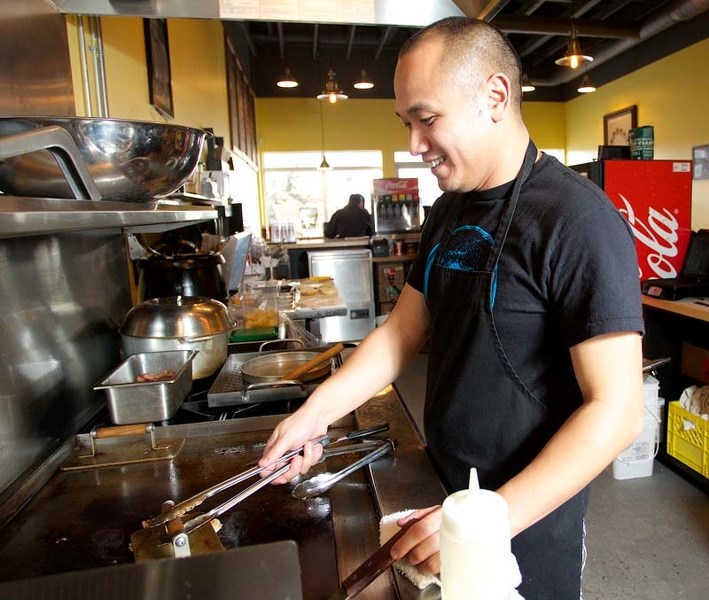Part of Tu Le's success in bringing his burger business, Jack's Burger Shack, into St. Albert was the lack of red tape he experienced.
Le, who formerly owned businesses in Vancouver and Slave Lake, said bigger cities make it difficult to work through the licensing and development process, and offer little guidance. In Vancouver, he said you easily get lost in the mix.
"So many businesses open and you are really just a number," he said. "Here they get to know your name and there's more of a community feel, a family feel. They want to help you out," he said.
A recent survey by the Canadian Federation of Independent Business found that five of the top 10 entrepreneurial cities in Canada are located in Alberta and Saskatchewan.
The Communities in Boom survey looked at 107 cities across the country, and determined which ones were the strongest in entrepreneurial activities. The Greater Edmonton area – which includes St. Albert – took fourth place in the overall score, while the City of Edmonton took sixth.
Cities were compared based on three main categories: presence, perspective and policy. Last year, St. Albert was considered part of Edmonton and took eighth place, leading in business presence and perspective but lacking in policy matters.
That has turned around now, with the Greater Edmonton Area being separated from Edmonton and leading in entrepreneurial policy, meaning that local governments are trying their hardest to support local entrepreneurs, said CFIB chief economist Ted Mallett.
"We know that most economic development in cities doesn't come from big businesses relocating into a big city or setting up a big operation," he said. "It really comes from local residents that start their own business and grow that business in their own city."
Mallet added that suburban municipalities tend to be more conducive to smaller and midsized businesses, due to lower costs and more balanced ratios for commercial and residential properties.
St. Albert businesses struggle with financing, labourers
St. Albert has become more business friendly and more companies are moving into the city, said Lynn Carolei, chair of the St. Albert and District Chamber of Commerce.
She cautioned though that retail-related businesses generally experience less red tape in the community than companies in the oil business. And many small or medium-sized entrepreneurs face different barriers now, such as finding suitable rental properties, employees and financial aid, she said.
"Depending on what kind of business you have banks are a little more cautious than they were a number of years ago," she said. "And the labour market is so tight right now it can be a challenge for a small business to open and find suitable candidates to employ."
In smaller cities and suburbs, entrepreneurs then depend even more on their ability to connect with their customer base and retain them, added Caroline Riske, owner of Wellness Within Health & Learning Centre at the Enjoy Centre.
Most small businesses are based on referrals, and earning customer trust can take time and dedication and the "right kind of gossip," she said.
The spa replaced two former businesses that had failed at the centre, and Riske said she is still proving that she's in for the long haul but has been well received so far.
"As long as you cater to the community you serve, the business will thrive," she said. "If not then you don't have as many people to rely on. You have to make sure that the community you are moving into will receive what you are offering."
Riske opened her spa in March 2013 after seven years in business in Edmonton. Compared to the bigger city, she said St. Albert's red tape was very easy to navigate.
"Any sort of development permits or any sort of licensing needed in Edmonton I typically waited two to three hours," she said. "In St. Albert I was able to be in and out in about 15 minutes and I had direct contact with the development officers via email or phone."
Le added that many of the smaller businesses in St. Albert, especially in the Perron District, help each other. Not being a big chain store or located directly on St. Albert Trail, he said you need to work together and depend on the support of residents, the chamber of commerce and city administration.
That's why Mallet recommends that the economic development community and local governments pay attention to the needs of small and medium sized business owners, and make red tape as easy to navigate as possible.
Local entrepreneurs, he said, depend on customers walking in the door rather than setting their trust in the market. While Alberta and Saskatchewan-based cities continue to be entrepreneurial leaders and profit from a healthy economy, he warns that the economy can easily turn around.
That's why cities should address any regulatory problems now, rather than waiting them out – however small they may seem.
"Alberta knows that its economy can be quite cyclical and when things get problematic it can happen in a hurry," he said. "So let's make sure that we don't burden businesses unduly with things that they cannot handle during hard economic times."




